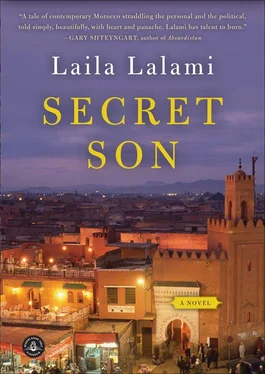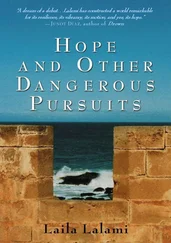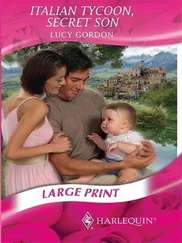“If we are to truly succeed,” Hatim went on, “we must first return the community to the state of purity it has lost. That way, we can reform our society from the bottom up. Our morals have become completely muddled by our blind love for the West. They have to become unmuddled . We have to regain the purity we have lost, and we can do that through the Islamic values we have neglected. Until we can return to the roots of our faith, until we can apply the precepts of our faith to every single aspect of our life, we will never be able to rise above the sin, the poverty, and the misery that have befallen us.”
Youssef thought about what Hay An Najat could look like in a few years: real houses, good schools, safe roads — a new world in which someone like him might even have something to do and a place to call his own.
“But,” Hatim yelled, raising his finger upward and bringing Youssef back from the vision he was entertaining, “our problems run much higher. Our community’s fall into disgrace started with our political leaders. Oh, and what leaders! They promised to build schools and hospitals, create jobs for the young, and improve our economy. Of course they did none of that. The years come and go, governments follow one another, but our literacy rate stays the same, our hospitals remain ill equipped, and our economy still depends on agriculture and tourism. Like sheep, our foreign-educated elite want to do whatever France or America wants them to do, without regard for whether it is good for the rest of us. And in the process they waste or steal our money. They are a small number of people, those decadent few, but they are the real obstacles to progress. So you see, our society is rotten from the bottom up, but also from the top down. And only by purifying it at all levels will we be able to make tangible progress.
“Now, as you know, our efforts at reforming our society have been met with a lot of resistance. We expect this struggle. In fact, we welcome this struggle. After all, God is on our side, and He will not fail us. The battle between the forces of good and the forces of evil is upon us, and it is time, my son, for each one of us to choose sides. Are you with us? Will you side with the fallen, those who promote the mixing of the sexes, cast their hungry eyes on women, listen to filthy music, watch indecent movies, and drink the forbidden drink? Will you side with those who line their pockets with our taxes, steal from the poor to give to the rich, falsify election results to suit their purposes, brutalize and torture everyone who dares stand up to them? Or will you side with your brethren, those who promote virtue and forbid vice, avert their eyes when they see women, and protect children from licentious magazines and television shows? Will you side with those who help the poor, give to charity, spend their time in prayer, and work for a better tomorrow?”
Youssef stared, unsure what to say. Was this why he had been called — to pledge allegiance to one side or the other?
Hatim looked at him impatiently. “Let me make it simpler for you, my son. Do you want to stand side by side with the people of Hay An Najat, with your friends and neighbors, the people you see every day? Or would you rather side with the people of Casablanca? Lord, I hate that city, that place of filth and sin, where men and women walk hand in hand in plain view, where our daughters prostitute themselves to foreigners, where the Jews control our businesses, where the rich are taking advantage of the poor.” He cleared his throat. “You must choose, my son. Are you on the side of your mother or your father?”
“My father?” Youssef said breathlessly. Only one thought raced in his mind now: Amin told him about me, Amin betrayed me. “What would you know of my father?”
Hatim gave him a quick smile. “I know more than enough about Nabil Amrani, my son. I’ve known for a long time.” The Al Aqsa clock suddenly went off, broadcasting the call to the afternoon prayer, but Hatim, leaning forward in his chair, stared unblinkingly at Youssef. “Well? Are you on your mother’s side, or your father’s?”
“My mother’s,” Youssef whispered.
Hatim sat back in his chair and smiled. “Of course. How could it be otherwise, when you look around you, when you consider what the others have done to us?” he said, thumb pointed at his chest. “I know what you have gone through. You have studied, you have worked hard, you have played by the rules, and all for what? Here you are, jobless, with no prospects, no way to support your mother or to start a family of your own. Meanwhile, those who are responsible for what happened to you are sitting in their fancy houses in Anfa. Do you think it is right that your father should live in a mansion and you and your mother should live here? How long can we tolerate this kind of injustice? How long before we rise up and demand that things change?”
Youssef had still not recovered from the shock of hearing his father’s name on Hatim’s lips. He was mesmerized, unable to stop his anger toward his father and his father’s world from kindling in his heart once again. This time it was taking the shape of a star, and he had trouble keeping it from radiating in all directions.
“I have been thinking for a while about how this senseless situation in our community is allowed to continue. And I have come to see that it is all because there is no perception about what is going on. I read a lot of these papers.” He pointed to a pile of newspapers and magazines on the floor beneath the window. “And I am always appalled at how journalists conduct their business. They do not report the truth. They may promote the views of the government, or the views of their parties, or the views of the West. But they always lie. They never give us voice. They don’t listen to our grievances. They ignore what we have to say about how we can reform our ways through our faith. They want to keep God out of everything. Let me tell you something: they can’t. So the time has come to send them this message: Enough of your lies!” He slammed his fist on his desk, spilling some coffee on the papers.
Hatim’s words were like a labyrinth in which Youssef was losing his way. His anger blinded him; he could not find the exit on his own and instead began to take each turn that presented itself without question. When the Al Aqsa clock broadcast its second reminder, he was so startled that he stood up. “The call to prayer,” he said. “You will be late for prayer.”
Hatim pulled him back down by the wrist. “Prayer can wait, my son. There are times for prayer, and there are times for action. We are having an important conversation. Moussa?”
Moussa came around the desk to the computer. With a few clicks of the mouse, he had connected to a video-sharing Web site and was already playing a clip, made up of still photographs, grainy and unfocused. An unseen man read a long series of names of students and activists, men and women, young and old, who had been killed in prisons and torture centers during the Years of Lead. “You are told,” Moussa said, “that Derb Moulay Cherif and Tazmamart belong in history, that you’re living in a new age now. But watch this.” He played another video clip. This one had hidden-camera footage of riot police beating demonstrators on a campus in Meknès, customs officers stopping cars on the freeway in order to get bribes, judges rendering sentences on hundreds of young bearded suspects at once. It was true, Youssef thought. Too little had changed in the country.
Afterward came images of thugs beating up student protestors. For a moment, Youssef thought that this was another sample from a campus somewhere in the heart of the country, but when one of the men spoke (“ana ma ‘amiltish haga”) he realized the demonstrators were Egyptian. Suddenly he felt a new kinship with the young people of Egypt, whose struggles were so similar to his own.
Читать дальше












